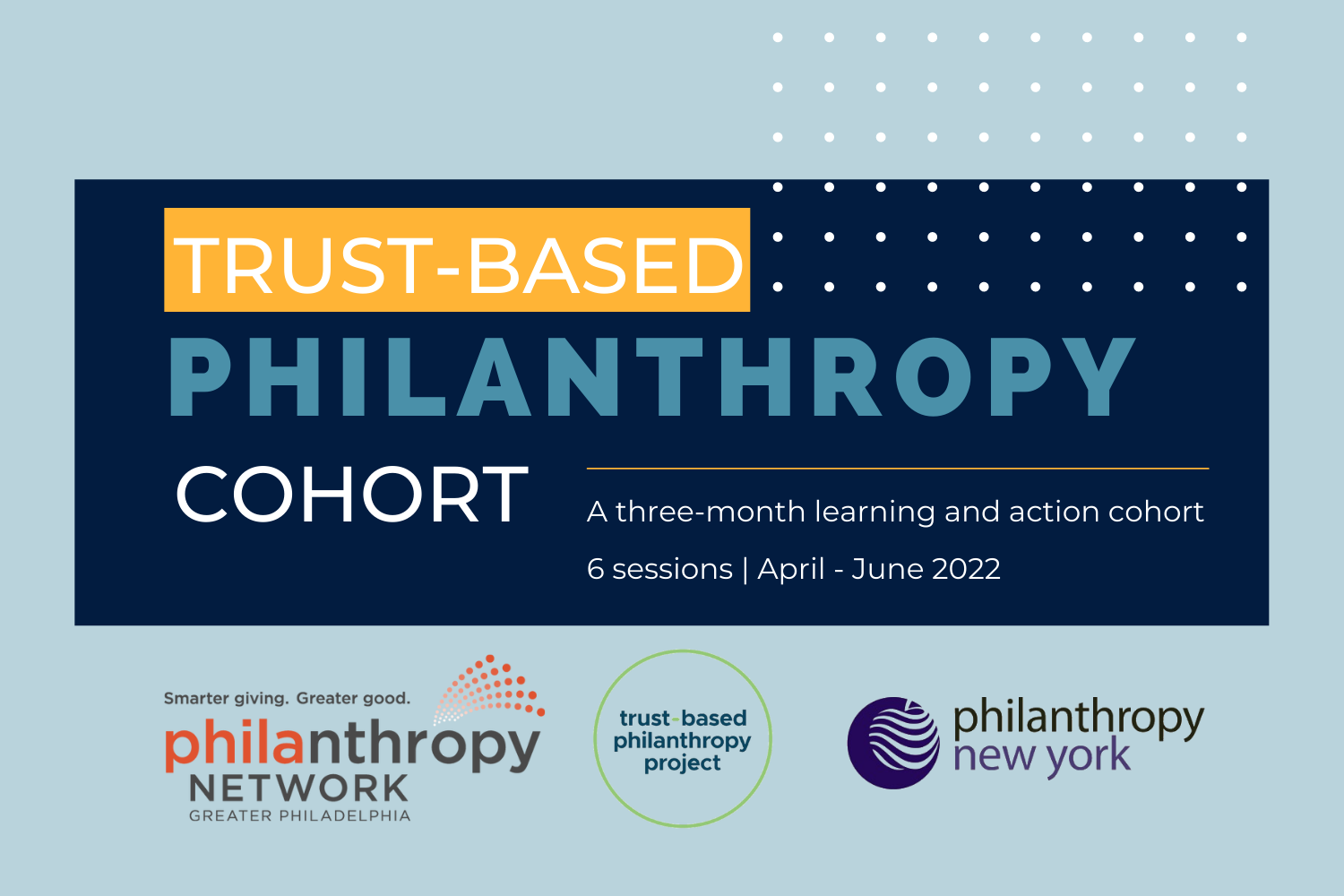
By Mariah Casias, VP of Learning and Evaluation, Philanthropy Network Greater Philadelphia and Yi-Ching Lin, VP of Learning, Philanthropy New York
Philanthropy Network Greater Philadelphia and Philanthropy New York are partnering with the Trust-Based Philanthropy Project, advised by CHANGE Philanthropy, for a brand new cohort series! The three-month Trust-Based Philanthropy Cohort Series for Philanthropy Network and PNY Members only is specifically designed to bring together trust-based philanthropy principles with racial equity practices.
Since launching this exciting new partnership, members have reached out to learn more as they decide whether it’s right for them. To help share this information across the network, we put together this brief FAQ of some of the most common questions. We hope this leaves you with a better understanding of the purpose of this cohort and how it can help you or your colleagues advance your commitment to racial equity through trust-based philanthropy.
What?
What is unique about this Trust-Based Philanthropy Cohort, and what will I learn?
This Trust-Based Philanthropy Cohort Series is a three-month learning and action cohort, intentionally designed to unpack the interconnection between trust-based philanthropy and racial equity work. While these themes have been explored in past programs, this is the first cohort to provide a dedicated space to dive deep with an intersectional lens.
At its core, trust-based philanthropy begins with understanding power -- and acknowledging how race, gender, and other factors of positionality shape our lived experiences and our relationship to power. We believe that grantmakers have a responsibility to recognize that they’re operating within an inequitable system that has perpetuated a racial wealth gap. Meanwhile, white dominant norms and perspectives have informed and influenced perceptions of who is deemed trustworthy and who is not. Being a trust-based funder requires constant and continuous examination of the implications of such biases in our day-to-day decision-making, as well as our culture, structures, leadership, and practices.
This cohort is specifically designed for senior leaders of grantmaking organizations who are ready to embrace and/or deepen their commitment to trust-based philanthropy with a particular focus on advancing racial equity. We will examine how philanthropy sits within larger economic inequalities and can replicate, demonstrate, or exacerbate them in the process.
The curriculum will include an examination of power inequity vis-à-vis white dominant culture, structures, and norms; a history of the extractive labor that has contributed to philanthropy’s wealth accumulation; and a deep dive into how values of racial equity and power-sharing can inform your organization’s internal culture and leadership, as well as your grantmaking structures and practices. Participants will walk away with new peer connections, tools, and clear action steps that they can implement in leading organizational change toward trust-based, racial-equity-focused philanthropy.
The curriculum will be broken out into six virtual sessions over three months. Sessions will be three hours long, including time for breaks, small group breakouts, as well as light homework assignments between sessions. Below is an outline of the conversations we will host:
- Confronting Historical Power Imbalances in Philanthropy - April 7
- Aligning Trust-based Values with Organizational Culture - April 28
- Trust-Based Leadership with an Anti-Racist Lens - May 12
- Optimizing Organization Structures to Support Trust-Based Approaches to Your Grantmaking - May 26
- Applying Racially Equitable, Trust-Based Approaches to Your Grantmaking - June 16
- Clarifying Next Steps on Your Trust-Based Journey - June 30
Who?
Who should attend?
This cohort series is for Philanthropy Network Greater Philadelphia and Philanthropy New York Members only. This cohort opportunity is offered to “senior leaders in both operational and grantmaking roles.” What that looks like may be different for different foundations. Our intention is to support those who have influence in shaping the culture, structures, leadership, and grantmaking practices of institutions regardless of positional power. For example, a program officer at a larger foundation who has a great deal of influence over the grant application and review process; or a staff member at a smaller foundation who may be responsible for designing and running all programs, along with managing the board and/or fundraising. Board members or trustees are also strongly encouraged to apply. Although we are role-agnostic, we hope to prioritize a good balance of ops and grantmaking roles, if possible, especially when joining the cohort and working in pairs.
Strong applicants will have experience contributing to a peer learning environment and indicate interest in learning from peers and a desire to be part of a community.
Please also note that this program is not intended for those who are relatively new to racial equity work and trust-based philanthropy. We are intentionally curating a space for learners who are ready to engage in racial equity and trust-based work. Indicators of individual readiness may include familiarity with key terms and concepts and an ability to articulate the purpose of this work. Indicators of organizational readiness may include external commitments, investments in staff and/or strategy, changes to internal and/or external operations, and comfort in having conversations around power.
Who are the key players?
The curriculum has been developed by the Trust-Based Philanthropy Project in close consultation with CHANGE Philanthropy. The lead faculty for this program will be Pia Infante, Co-Executive Director of the Whitman Institute and Steering Committee Member of the Trust-Based Philanthropy Project with additional perspectives from other philanthropy leaders brought in throughout the series.
Why?
Why is there an added cost to join the cohort beyond our membership fee?
On a regular basis, and especially for certain deep-dive or cohort-based programs, Philanthropy New York and Philanthropy Network Greater Philadelphia partner with sector experts to bring specific and curated trainings to members. Engaging outside partners at a substantial cost to us requires that we charge members a registration fee to cover the direct costs of working with consulting firms and co-facilitators.
Learn more and apply today. The deadline to submit applications has been extended to February 11, 2022, at 5:00 pm ET.
Philanthropy Network members, please reach out to Mariah Casias, Vice President of Learning & Evaluation with any questions.
